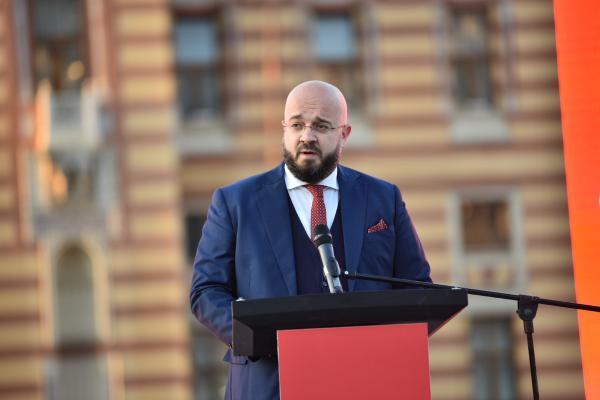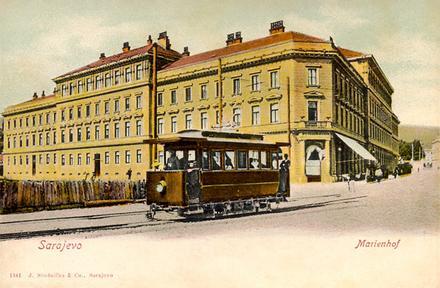With vehicles that haven’t been replaced since it hosted the winter Olympics, it’s time for a Sarajevo tram modernisation. EU financing backs better urban infrastructure that will cut emission and help counter climate change
When the antiquated trams he drives on the Sarajevo streets break down, Hidajet Šarić has to drive them backwards to the maintenance depot, a dangerous procedure with poor visibility for the driver that poses a serious danger of road accidents. The last time the tram system had new vehicles was just before the 1984 Winter Olympics.
“Many of the trams I drive are the same ones I used to travel on when I was a child,” says Šarić, who is 46.
A new investment signed by the European Investment Bank in March with the Bosnia and Herzegovina’s Ministry of Finance and Treasury aims to improve urban transport in the Sarajevo canton. The €40 million financing will modernise and extend the tram and trolley bus networks by replacing existing vehicles and building new tramlines and tracks.
Better urban transport helps cut carbon dioxide emissions and air pollution, especially in the large cities. But climate change isn’t the only factor in transport investment now. COVID-19-related travel restrictions and disruptions in supply chains hit the sector severely and constrained modernisation and decarbonisation.
That’s particularly true in the Western Balkans due to a decades-long investment gap that continues to impede the development of modern transport systems that respond to new social, environmental and climate needs.

Better commuting and living conditions for people in Sarajevo
The European Investment Bank-financed improvements will upgrade safety and living conditions for people in the capital city of Bosnia and Herzegovina and its surrounding municipalities.
“We are grateful to the representatives of the European Investment Bank for supporting such a high-quality and important project for the people of Sarajevo, but also for all those who come to visit the city,” said Vjekoslav Bevanda, Bosnia and Herzegovina’s Minister of Finance and Treasury, as he signed the European Investment Bank loan in March.
Cleaner and greener city with Sarajevo tram modernisation
The establishment of a more efficient and reliable public transit system will enable a shift of passengers from private to public transport. As a result, it will reduce commuting times, air pollution, noise and traffic accidents. At the same time, the travel experience will improve as the existing trams do not have air conditioning and their interior is dilapidated.

Adnan Šteta, Minister of Transport in the Sarajevo canton
Adnan Šteta, Minister of Transport in the Sarajevo canton, explains that the idea for the project of modernisation of the public transport mainly grew out of the need to cut air pollution in the city. “The new system and vehicles equipped with the latest technologies will help us increase the number of passengers in public transport and decrease traffic congestion in the city,” he says. “We’ll have a cleaner and greener Sarajevo.”
The project will contribute to the fulfilment of the EU Strategy for the Western Balkans and the European Investment Bank’s climate action goals for the region.
“The COVID-19 crisis imposed a new priority for us as the EU bank – to ensure that the recovery from the pandemic is green,” says Lilyana Pavlova, the European Investment Bank Vice President responsible for the Western Balkans. “Sustainable mobility is a key step in that direction and we are glad that we have signed the financing for this important investment for the capital of Bosnia and Herzegovina. It will help the city address, mitigate and adapt to climate change.”
Sustainable and smarter mobility address future needs
The Sarajevo tramway dates back to New Year’s Day, 1885, when it was initially launched as a test line by the Austro-Hungarian imperial administration, before installing the new technology in Vienna. Thanks to these safety trials for novel electricity and transport prototypes, Sarajevo had street lighting and a tram network even before the imperial capital and many other cities across Europe. The network didn’t stop working for over a century, even through the two world wars.

Mindful of this heritage, the European Union is keen to support Sarajevo’s move to smarter, more sustainable urban transport options, financing it with the European Investment Bank and European Bank for Reconstruction and Development.
“Urban mobility and sustainable, green public transportation are high on the agenda of the European Union,” says Johann Sattler, head of the EU Delegation and EU Special Representative in Bosnia and Herzegovina. “This project will support a shift to more environmentally friendly public transport and provide citizens with more affordable, accessible, healthier and cleaner alternatives in Sarajevo.”
